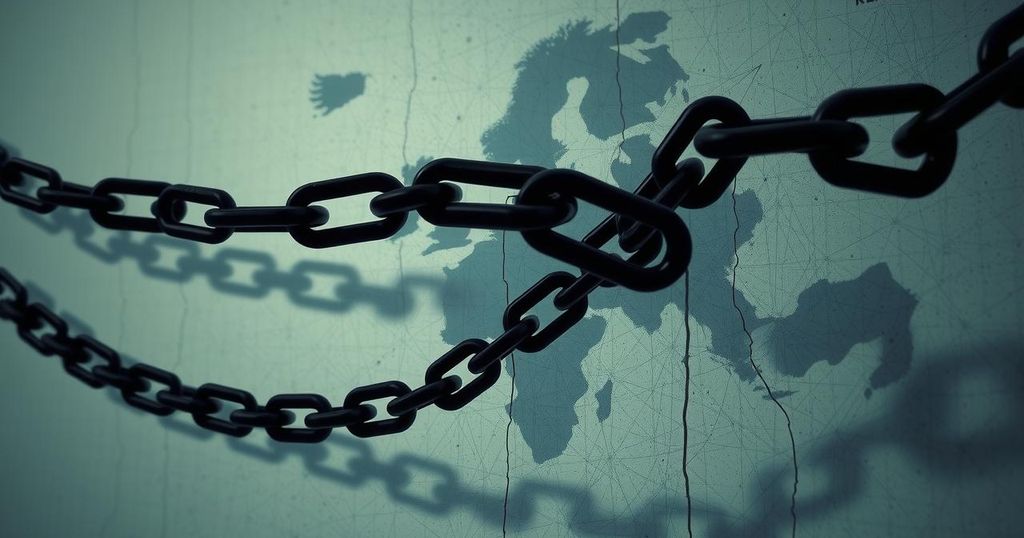World news
ALEXANDER LUKASHENKO, ASIA, BELARUS, EUROPE, EUROPE/ASIA, INTERNATIONAL RELATIONS, IVAN KUBRAKOV, KALINOUSKI REGIMENT, KASTUS KALINOUSKI REGIMENT, LUKASHENKO, MILITARY, MILITARY SUPPORT, MINSK, PEACE NEGOTIATIONS, RUSSIA, RUSSIA-UKRAINE WAR, SBU, SECURITY SERVICE OF UKRAINE, STV, UKRAINE, VA, VASIL VERAMEICHYK, VIETNAM, WAR
Stella Nguyen
0 Comments
Lukashenko’s Fear of Armed Uprising Amid Belarusian Extraditions
Belarusian dictator Alexander Lukashenko perceives soldiers volunteering for Ukraine as threats to his rule, leading to aggressive pursuits and harsh reprisals against dissenters. The recent extradition of Belarusian soldier Vasil Verameichyk reflects severe state repression and propaganda efforts to stifle resistance. Concurrently, Lukashenko’s reliance on Russia complicates his ability to manage dissent, while he seeks a recalibrated relationship with Western powers amidst growing tensions.
Belarusian dictator Alexander Lukashenko perceives Belarusian volunteers fighting for Ukraine as a formidable threat to his regime, categorizing them as terrorists. The recent extradition of Vasil Verameichyk from Vietnam exemplifies the regime’s relentless pursuit to penalize any dissenters. Verameichyk served in the Kastus Kalinouski Regiment, a volunteer unit supporting Ukraine, and was abducted in Vietnam before being extradited to Belarus.
The situation has incited condemnation from Sviatlana Tsikhanouskaya’s office, which highlighted that Verameichyk’s extradition stems from the oppressive measures applied by Lukashenko’s regime. This incident illustrates a tactic of intimidation, where dissenters face brutal reprisals, even outside Belarus. Subsequently, Verameichyk was coerced into making false allegations during a televised propaganda session.
Lukashenko’s regime aims to undermine resistance by aggressively pursuing Belarusians engaged in combat. November 2022 statements by the Ministry of Internal Affairs indicated that approximately 160 Belarusians involved in Ukraine’s combat efforts would face legal repercussions. These soldiers symbolize defiance against Russia and Lukashenko, posing a potential risk of leadership in future resistance movements.
Pavel Slunkin, an expert at the European Council on Foreign Relations, expressed concern for the plight of Belarusian fighters. He shared, “Vasil’s case highlights the vulnerability of Belarusian volunteers,” noting their lack of protection from potential governmental reprisals. The overarching fear remains regarding interventions by the Belarusian KGB or Russian FSB as these agencies pursue dissenters globally.
Lukashenko’s actions reflect a heightened paranoia regarding organized resistance. Yuliana Shemetovets from the Belarusian Cyber Partisans noted, “He has seen examples like Prigozhin’s march and the situation in Syria,” indicating Lukashenko’s awareness of how quickly an established regime could topple. This escalates his campaign against dissenters, serving as a stark warning to anyone contemplating participation in the conflict in Ukraine.
In parallel to his crackdown on dissent, Lukashenko has exhibited a growing dependence on Russia, wherein Belarus functions as a strategic base for Moscow’s military operations. Reports by the Institute for the Study of War indicate that Russia’s absorption of Belarus is approaching completion, further empowering its military ambitions.
Despite such challenges, Lukashenko is reportedly seeking limited engagement with Western powers. A recent unannounced meeting with U.S. officials led by Deputy Assistant Secretary Christopher W. Smith may indicate a shift in diplomatic relations. Lukashenko signaled a potential easing in domestic repression in exchange for broader international acceptance and the release of political prisoners.
Amidst these international maneuvers, Lukashenko remains exceedingly vigilant against exiled Belarusian fighters. His fear predominantly stems from recognizing these volunteers as harbingers of potential uprising. Undoubtedly, the regime’s loathing for these fighters comes with the knowledge that decisive action against them may be limited.
Political science expert Taras Kuzio speculated on the restrained presence of Belarusian volunteer battalions entering Belarus. He suggested potential clandestine agreements between Lukashenko and Ukrainian President Volodymyr Zelensky, hinting at mutual interests against intensified militaristic confrontations. Zelenksy recounted a previous call from Lukashenko regarding missile launches from Belarus, signifying complex diplomatic tensions.
In conclusion, Alexander Lukashenko remains deeply troubled by the presence of Belarusian volunteers supporting Ukraine, viewing them as symbols of resistance to his regime. This motivates a widespread campaign of repression against dissenters, characterized by international extraditions and propaganda. Simultaneously, Lukashenko’s increasing dependence on Russia highlights his precarious position. Although he seeks reconciliation with the West, the fear of insurgency lingers, as does his strategy to eliminate potential threats from Belarusians fighting against Russian aggression.
Original Source: www.kyivpost.com




Post Comment